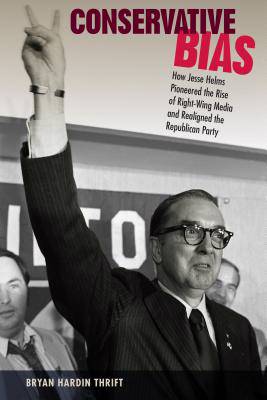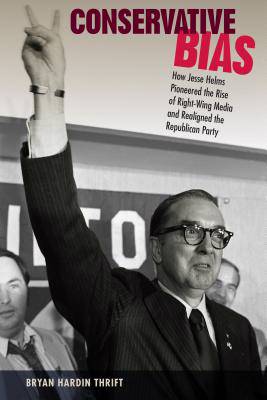
- Afhalen na 1 uur in een winkel met voorraad
- Gratis thuislevering in België vanaf € 30
- Ruim aanbod met 7 miljoen producten
- Afhalen na 1 uur in een winkel met voorraad
- Gratis thuislevering in België vanaf € 30
- Ruim aanbod met 7 miljoen producten
Zoeken
Conservative Bias
How Jesse Helms Pioneered the Rise of Right-Wing Media and Realigned the Republican Party
Bryan Hardin Thrift
€ 35,95
+ 71 punten
Omschrijving
"Conservative Bias examines one of the most notorious figures of modern American politics: Jesse Helms. Thrift shows that Helms was not merely a right-wing demagogue but rather a brilliant media mastermind who built a national movement from a little television soundstage in Raleigh."?Neil J. Young, Princeton University "In this careful, thoughtful, and thoroughly researched study, Bryan Hardin Thrift provides the first comprehensive study of Jesse Helms's long career as a conservative journalist and television ideologue prior to his long tenure as a U.S. senator from North Carolina."--William A. Link, author of Righteous Warrior: Jesse Helms and the Rise of Modern Conservatism "Traces a little-known, but pivotal, phase of Helms's pre-senatorial career and explains how the future New Right leader used the power of local television broadcasts in the 1960s to forge a new ideology that moved the nation to the right."--Daniel K. Williams, author of God's Own Party Before Bill O'Reilly and Glenn Beck, there was Jesse Helms. From in front of a camera at WRAL-TV, Helms forged a new brand of southern conservatism long before he was a senator from North Carolina. As executive vice president of the station, Helms delivered commentaries on the evening news and directed the news and entertainment programming. He pioneered the attack on the liberal media, and his editorials were some of the first shots fired in the culture wars, criticizing the influence of "immoral entertainment." Through the emerging power of the household television Helms established a blueprint and laid the foundation for the modern conservative movement.
Bryan Thrift mines over 2,700 WRAL-TV "Viewpoint" editorials broadcast between 1960 and 1972 to offer not only a portrait of a skilled rhetorician and wordsmith but also a lens on the way the various, and at times competing, elements of modern American conservatism cohered into an ideology couched in the language of anti-elitism and "traditional values." Decades prior to the invention of the blog, Helms corresponded with his viewers to select, refine, and sharpen his political message until he had reworked southern traditionalism into a national conservative movement. The realignment of southern Democrats into the Republican Party was not easy or inevitable, and by examining Helms's oft-forgotten journalism career, Thrift shows how delicately and deliberately this transition had to be cultivated.
Bryan Thrift mines over 2,700 WRAL-TV "Viewpoint" editorials broadcast between 1960 and 1972 to offer not only a portrait of a skilled rhetorician and wordsmith but also a lens on the way the various, and at times competing, elements of modern American conservatism cohered into an ideology couched in the language of anti-elitism and "traditional values." Decades prior to the invention of the blog, Helms corresponded with his viewers to select, refine, and sharpen his political message until he had reworked southern traditionalism into a national conservative movement. The realignment of southern Democrats into the Republican Party was not easy or inevitable, and by examining Helms's oft-forgotten journalism career, Thrift shows how delicately and deliberately this transition had to be cultivated.
Specificaties
Betrokkenen
- Auteur(s):
- Uitgeverij:
Inhoud
- Aantal bladzijden:
- 276
- Taal:
- Engels
- Reeks:
Eigenschappen
- Productcode (EAN):
- 9780813062341
- Verschijningsdatum:
- 27/09/2016
- Uitvoering:
- Paperback
- Formaat:
- Trade paperback (VS)
- Afmetingen:
- 152 mm x 229 mm
- Gewicht:
- 408 g

Alleen bij Standaard Boekhandel
+ 71 punten op je klantenkaart van Standaard Boekhandel
Beoordelingen
We publiceren alleen reviews die voldoen aan de voorwaarden voor reviews. Bekijk onze voorwaarden voor reviews.











